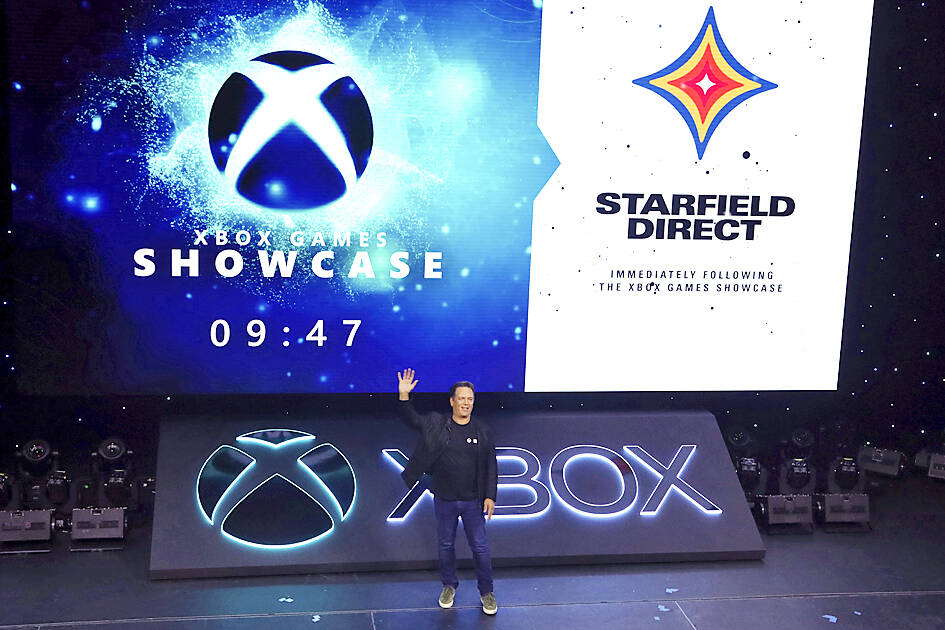The US Federal Trade Commission (FTC) on Monday asked a federal court to block Microsoft Corp from completing its US$69 billion buyout of gaming giant Activision Blizzard Inc, a court filing showed.
“A preliminary injunction is necessary to ... prevent interim harm” while the FTC determines whether “the proposed acquisition violates US antitrust law,” the regulator said in the filing.
In requesting the preliminary injunction at the US District Court for the Northern District of California, the US government sought to prevent the companies from finalizing the deal before a July 18 deadline.

Photo: AP
An FTC hearing is set for August to argue the merits of the deal, but the appeal to a federal court would potentially see Microsoft subject to a restraining order blocking the accord before that process has run its course.
The California judge would need to agree to stop the deal after hearing arguments by the FTC on why the buyout is illegal and from Microsoft on why it should go ahead.
“We welcome the opportunity to present our case in federal court,” Microsoft president Brad Smith said.
“We believe accelerating the legal process in the US will ultimately bring more choice and competition to the market,” he added.
Xbox owner Microsoft launched a bid for Activision Blizzard early last year, seeking to establish the world’s third-biggest gaming firm by revenue after China’s Tencent Holdings Ltd (騰訊) and Japan’s PlayStation maker Sony Group Corp.
While the EU has greenlit the deal, The UK’s Competition and Markets Authority blocked it in April, saying it would harm competition in cloud gaming.
The FTC in December last year sued to block the transaction with Activision Blizzard, maker of the blockbuster Call of Duty title, over concerns that it would stifle competition.
The regulator is led by Lina Khan, an antitrust academic who had been an advocate of breaking up the biggest tech firms before she was nominated by US President Joe Biden to the job in 2021.
Khan has accused Meta Platforms Inc, Facebook’s parent company, of stifling competition by buying up start-ups and the FTC has carried out investigations of Amazon.com Inc.
Meanwhile, the US Department of Justice has filed lawsuits arguing that Google has committed antitrust contraventions in online search as well as in advertising.

Taiwan Semiconductor Manufacturing Co (TSMC, 台積電) yesterday said that its investment plan in Arizona is going according to schedule, following a local media report claiming that the company is planning to break ground on its third wafer fab in the US in June. In a statement, TSMC said it does not comment on market speculation, but that its investments in Arizona are proceeding well. TSMC is investing more than US$65 billion in Arizona to build three advanced wafer fabs. The first one has started production using the 4-nanometer (nm) process, while the second one would start mass production using the

A TAIWAN DEAL: TSMC is in early talks to fully operate Intel’s US semiconductor factories in a deal first raised by Trump officials, but Intel’s interest is uncertain Broadcom Inc has had informal talks with its advisers about making a bid for Intel Corp’s chip-design and marketing business, the Wall Street Journal reported, citing people familiar with the matter. Nothing has been submitted to Intel and Broadcom could decide not to pursue a deal, according to the Journal. Bloomberg News earlier reported that Taiwan Semiconductor Manufacturing Co (TSMC, 台積電) is in early talks for a controlling stake in Intel’s factories at the request of officials at US President Donald Trump’s administration, as the president looks to boost US manufacturing and maintain the country’s leadership in critical technologies. Trump officials raised the

‘SILVER LINING’: Although the news caused TSMC to fall on the local market, an analyst said that as tariffs are not set to go into effect until April, there is still time for negotiations US President Donald Trump on Tuesday said that he would likely impose tariffs on semiconductor, automobile and pharmaceutical imports of about 25 percent, with an announcement coming as soon as April 2 in a move that would represent a dramatic widening of the US leader’s trade war. “I probably will tell you that on April 2, but it’ll be in the neighborhood of 25 percent,” Trump told reporters at his Mar-a-Lago club when asked about his plan for auto tariffs. Asked about similar levies on pharmaceutical drugs and semiconductors, the president said that “it’ll be 25 percent and higher, and it’ll

CHIP BOOM: Revenue for the semiconductor industry is set to reach US$1 trillion by 2032, opening up opportunities for the chip pacakging and testing company, it said ASE Technology Holding Co (日月光投控), the world’s largest provider of outsourced semiconductor assembly and test (OSAT) services, yesterday launched a new advanced manufacturing facility in Penang, Malaysia, aiming to meet growing demand for emerging technologies such as generative artificial intelligence (AI) applications. The US$300 million facility is a critical step in expanding ASE’s global footprint, offering an alternative for customers from the US, Europe, Japan, South Korea and China to assemble and test chips outside of Taiwan amid efforts to diversify supply chains. The plant, the company’s fifth in Malaysia, is part of a strategic expansion plan that would more than triple